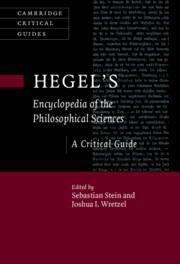Book contents
- Hegel’s Encyclopedia of the Philosophical Sciences
- Cambridge Critical Guides
- Hegel’s Encyclopedia of the Philosophical Sciences
- Copyright page
- Contents
- Contributors
- Introduction
- Chapter 1 Logical and Natural Life
- Chapter 2 Hegel’s Encyclopedia as the Science of Freedom
- Chapter 3 Essence in Hegel’s Encyclopedia and Science of Logic
- Chapter 4 The Concept’s Freedom
- Chapter 5 From Logic to Nature
- Chapter 6 Hegel’s Philosophy of Nature
- Chapter 7 Hegel’s Anthropology
- Chapter 8 Hegel’s Critique of Materialism
- Chapter 9 Hegel’s Psychology
- Chapter 10 Political Ontology and Rational Syllogistic in Hegel’s Objective Spirit
- Chapter 11 Taking the System Seriously
- Chapter 12 §§556–63: Art as a Form of Absolute Spirit
- Chapter 13 The Stubbornness of Nature in Art
- Chapter 14 The Encyclopedia’s Notion of Religion
- Chapter 15 Absolute Geist or Self-Loving God?
- Bibliography
- Index
- Cambridge Critical Guides
Chapter 9 - Hegel’s Psychology
The Unity of Theoretical and Practical Mind
Published online by Cambridge University Press: 07 August 2021
- Hegel’s Encyclopedia of the Philosophical Sciences
- Cambridge Critical Guides
- Hegel’s Encyclopedia of the Philosophical Sciences
- Copyright page
- Contents
- Contributors
- Introduction
- Chapter 1 Logical and Natural Life
- Chapter 2 Hegel’s Encyclopedia as the Science of Freedom
- Chapter 3 Essence in Hegel’s Encyclopedia and Science of Logic
- Chapter 4 The Concept’s Freedom
- Chapter 5 From Logic to Nature
- Chapter 6 Hegel’s Philosophy of Nature
- Chapter 7 Hegel’s Anthropology
- Chapter 8 Hegel’s Critique of Materialism
- Chapter 9 Hegel’s Psychology
- Chapter 10 Political Ontology and Rational Syllogistic in Hegel’s Objective Spirit
- Chapter 11 Taking the System Seriously
- Chapter 12 §§556–63: Art as a Form of Absolute Spirit
- Chapter 13 The Stubbornness of Nature in Art
- Chapter 14 The Encyclopedia’s Notion of Religion
- Chapter 15 Absolute Geist or Self-Loving God?
- Bibliography
- Index
- Cambridge Critical Guides
Summary
This essay charts the main stages of the account and the unity of the “Psychology” with specific attention to the role of the Concept, Hegel’s signature conception of self-referring negativity and self-particularizing universality. I argue that “free mind” should be conceived as the capacity to make valid practical inferences, where those inferences have the form of the purpose that is the key to Hegelian rationality. In this paper I read the “Psychology” through the classic question of whether knowing the good is sufficient for acting on the good (the internalism question). The structure of the “Psychology” makes it an obvious place to look for Hegel’s answer, for his “free mind” just is the unity of the judging (and inferring) capacities of the intellect with the volitional capacities of the will. I argue that while the free mind, as the structure of the practical inference, does to a great extent identify the will with practical reason, Hegel is also able through the Concept to make room for the counternormative within the normative. Showing how the derivation of free mind gives us a new way to think about familiar capacities and the internalism question also provides an indirect proof of Hegel’s Concept itself.
- Type
- Chapter
- Information
- Hegel's Encyclopedia of the Philosophical SciencesA Critical Guide, pp. 166 - 184Publisher: Cambridge University PressPrint publication year: 2021

